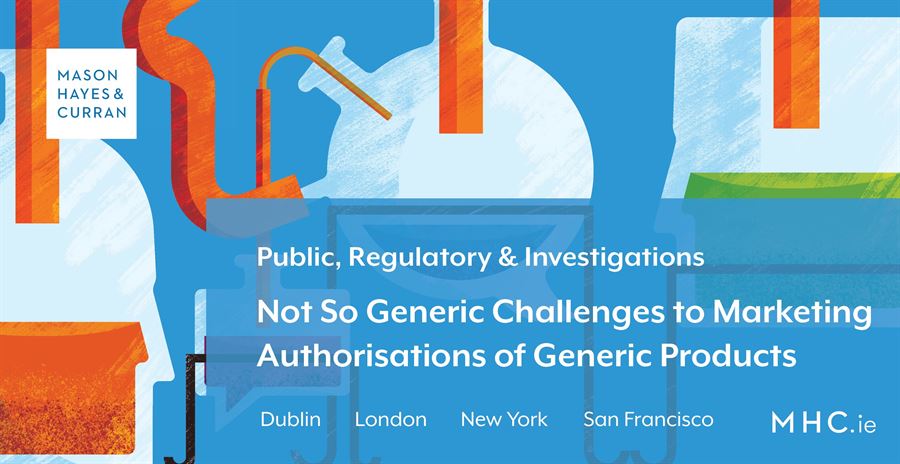
Generic marketing authorisations are the source of many legal disputes between pharmaceutical companies and regulators in the EU. The reasons can be wide-ranging but predominantly relate to the exclusivity period and the availability of exemptions in the authorisation procedure, which waive the requirements for clinical trials by bioequivalent studies. This gives rise to the dispute that generics may not be a copy of the innovator product.
Licensing generic products
The EU regulatory framework is governed by Directive 2001/83/EC for human medicinal products and Directive 2001/82/EC for veterinary medicinal products. These Directives, which are broadly identical in nature, set out the criteria for the granting of a licence or marketing authorisation for both generic and non-generic products.
Legal Challenges to Marketing Authorisations
As stated, one area in which disputes arise relates to the exemptions in the Directives afforded to generics. Unlike the strict scientific clinical requirements for licensing an innovator product, generic products enjoy the benefit of wide exemption provisions which waive the requirements for preclinical and clinical studies and bioequivalence studies under certain conditions.
For generic products to be authorised, it must be demonstrated that the active substance of the product has the same qualitative and quantitative composition as the reference product. The reference product is the original, or innovator, product that the generic product asserts to have bioequivalence with. Decisions of regulators have been challenged concerning the legal definition of “essentially similar” in the context of the qualitative and quantitative requirements of the active substances of both the innovator and generic product. A fraught issue that concerns generic products is the exemption provision in the Directive which waives the requirement of providing bioavailability studies where it can be shown that the active substance is “identical” to the reference product.
The exclusivity period of a marketing authorisation also gives rise to legal proceedings. Generic manufacturers can submit an authorisation request after eight years and market the product after 10 years. This system itself has given rise to extensive litigation as seen in the case of Novartis v Commission.
Aside from the challenge to a marketing authorisation itself, the off-label use of a pharmaceutical product has been the subject of litigation. In the case of Novartis v Agenzia Italiana del Farmaco, the CJEU held that Italy was entitled to reimburse the off-label use of the drug despite the availability of more expensive alternatives.
Approach of the Irish courts to challenges
The Irish courts have grappled with these legal challenges, particularly concerning the legal definition of a generic, such as in the pertinent cases of Scotia Pharmaceuticals Ltd v National Drugs Advisory Board. More recently, the courts have dealt with challenges to the withdrawal of a marketing authorisation by a regulator as in the case of Hygeia Chemicals Limited v. Irish Medicines Board. These actions are brought by means of judicial review proceedings. To challenge the grant of a marketing authorisation by a regulator, it must be shown that there was some procedural deficiency or irregularity in the authorisation decision-making process such as lack of jurisdiction, the application of the incorrect legal basis, procedural error, lack of consideration of relevant information to name but a few.
Conclusion
Disputes over marketing authorisations are multi-faceted and complex, requiring an in-depth knowledge of both scientific and legal issues. If disputes arise over issues such as the requirement that an active substance of a generic product is identical to the innovator product where bioavailability studies have been waived, there is a legal remedy available. If issues arise concerning exclusivity or the use of different excipients in the finished product, these can be adjudicated in the courts.
The Irish legal system has effectively adjudicated legal disputes concerning the granting of marketing authorisations for both generic and innovator products.
For more information on successfully defending challenges relating to marketing authorisation of a generic product, contact a member of our Public, Regulatory & Investigations team.
The content of this article is provided for information purposes only and does not constitute legal or other advice.
Share this:






